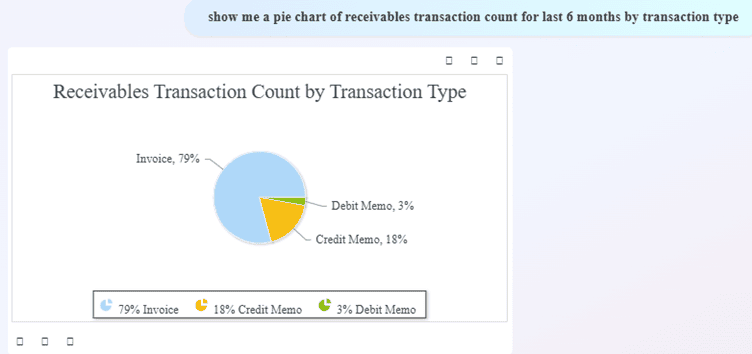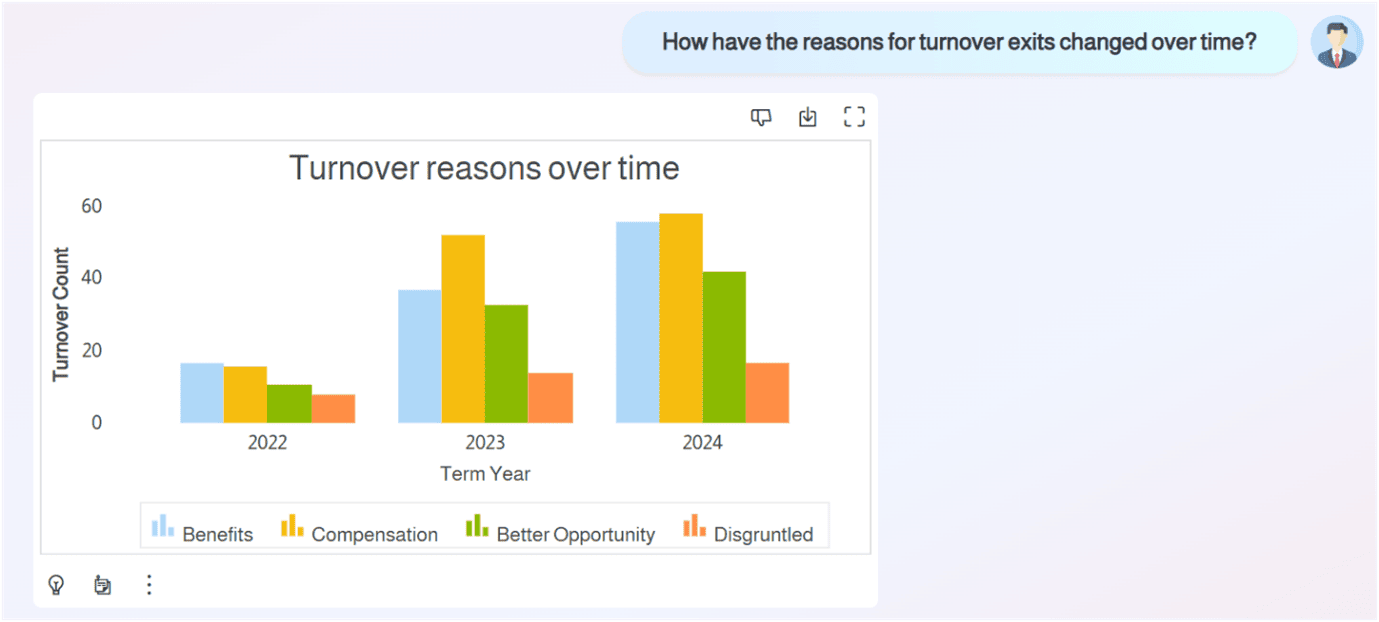The Problem: Reports That Speak SQL, Not Business
In most enterprises, data may be abundant. But it’s not always accessible.
Finance, HR, and operations teams have critical questions every day. But the answers? They’re buried inside Oracle dashboards, scheduled BI reports, or SQL-heavy drilldowns built for someone else’s use case.
Need a quick supplier comparison from Oracle Payables? Or last month’s headcount by location from Oracle HCM? That turns into a ticket. Then, a long wait. Then business users still must interpret a report on their own, often written in SQL they can’t tweak or sometimes, even read.
This is a breakdown in communication between business curiosity and technical capability.
The result is typically a waste of valuable time. But along with that, the business context gets diluted. And trust in data is steadily eroded.
Because when answers come days after the question, they’re already irrelevant.
The Shift: From Queries to Conversations
Conversational interfaces are everywhere. Alexa answers your grocery list questions, ChatGPT helps draft your emails, and Slack bots fetch project updates in real time.
Enterprise reporting is finally catching up.
Instead of writing SQL queries or navigating Oracle BI Publisher to find a specific report, users are starting to ask data questions the way they naturally think.
With conversational AI, business users can:
- Ask questions in plain English
- Get immediate, contextual answers from live data
- Iterate on follow-ups, like they would with a colleague
For example:
Instead of “Build a report for AP spend last quarter using Oracle SQL,”
You ask: “Why did vendor costs spike in April?”
And instead of hunting through multiple dashboards in Oracle Fusion or waiting for IT to build a BI report, you get instant clarity with the ability to dig deeper.
This isn’t more than just a regular UI upgrade. It’s a shift in how enterprise teams think about access, agility, and autonomy when it comes to reporting.
What a Conversation with Your Data Looks Like
Let’s say you’re a Finance Manager using Oracle Fusion. You’ve just noticed a dip in margins this month. Instead of opening multiple dashboards or emailing your analyst, you start with a simple question:
You ask:
“Why are vendor costs up this month?”
The system responds:
“Vendor costs increased by 14% in April, mainly driven by ABC Staffing and Zenith Logistics.”
You follow up:
“Was this expected or a one-off?”
System replies:
“No corresponding PO forecast variance found. This appears to be a spike.”
You dig deeper:
“Show me April line items from ABC Staffing over $25K.”
System returns:
An instant table + trend line pulled from Oracle Payables, filtered by supplier and transaction value.
In less than a minute, you’ve done what used to take:
- A support ticket,
- A SQL query on Oracle EBS,
- A manually filtered report,
- And multiple back-and-forth emails.
Why This Matters: Adoption, Agility, and Action
Most enterprise reporting tools are built for technical users, not decision-makers.
As a result, analysts spend up to 40% of their time building reports that go unused. Dashboards have it even worse. Only 2% of pre-built dashboards are accessed regularly. The rest gather digital dust.
And when business leaders can’t get answers fast enough, they default to what they know best: instinct.
3 in 5 enterprise leadersadmit to making decisions based on gut feelings. Over half say it’s usually because it's difficult to access insights in real time.
Conversational reporting removes these roadblocks. Instead of being stuck in a request/report cycle, users can:
- Ask their own questions
- Get faster, contextual answers
- Make decisions while the context is still fresh
The impact: Higher adoption. Faster action. Smarter decisions.
And fewer “I’ll get back to you once the report is ready” moments.
Real-World Shift: What Conversational Reporting Looks Like in Finance and HR
This shift from query-based to conversational reporting is already reshaping how teams work across Finance and HR.
Conversational Reporting In Finance
Before: You’d dig through Oracle Payables reports or request a custom SQL query.
Now: You just ask.
- “What’s our total AP spend this month?”
- “Who are our top 5 suppliers by spend?”
- “Any unusual spikes compared to last quarter?”

Conversational Reporting In HR
Before: You’d open multiple dashboards in Oracle HCM, only to find outdated or irrelevant views.
Now: You ask what you need to know—on the fly.
- “Show me headcount trends by region.”
- “Are we tracking toward our DEI hiring goals?”
- “What’s attrition like among high performers in the last 6 months?”

At SplashBI, we’re actively building for this shift, enabling natural language reporting experiences across Oracle ERP, Fusion, and HCM systems.
The goal is to make reporting feel less like querying a system, and more like having a conversation with your data.
Implications for BI and Reporting Teams
No, SQL skills are not obsolete.
But if your backlog is full of one-off report requests? That part of your role might be.
The rise of conversational reporting doesn’t replace BI teams. It repositions them. Instead of hand-coding every insight, BI leaders can now focus on:
- Building clean, reusable data models
- Defining metrics once, used many times
- Creating access layers with just enough guardrails for business teams
This shift turns BI from bottleneck to enablement engine.
Less time spent fulfilling report tickets.
More time spent ensuring the business has the right data foundations to ask and answer its own questions.
It’s more efficient. And it's definitely more strategic.
From Dashboards to Dialogue: The Future of Oracle Reporting
Oracle reporting is entering its next chapter, one where users don’t just run reports. They have conversations with their data.
We’re moving:
- From query-based workflows to natural-language conversations
- From delayed answers to real-time nudges
- From analyst-driven processes to user-driven exploration
The reporting tools of the future won’t just display data.
They’ll finally understand what you’re really asking - and help you act on it.
SQL will always have its place. But in today’s business environment, it shouldn’t be a prerequisite for insight. The most agile organizations are those where every team member can ask, iterate, and act - without waiting for a ticket to clear.
Enterprise AI is making this shift possible. And once you've worked this way, there's no going back.
SplashBI is helping organizations make this transition inside Oracle and beyond.
Curious what conversational reporting could look like for your team? Meet us at Oracle5Live to find out more.

